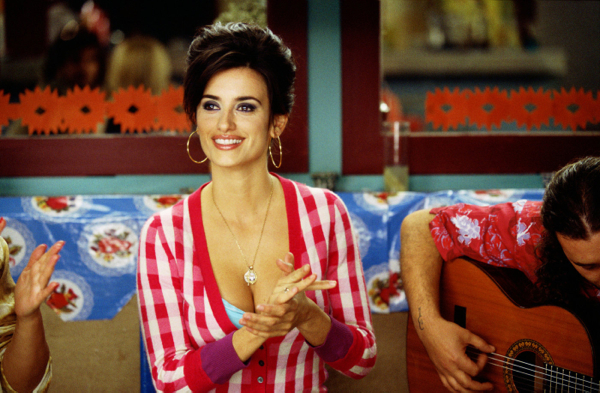Movie review by Greg Carlson
In the opening scene of Pedro Almodovar’s “Volver,” a group of women tends to cemetery plots, scrubbing and polishing the memorials of departed loved ones. While a strong wind makes these dutiful acts rather challenging, Almodovar quickly sketches one of his movie’s central themes: how the living think about and relate to the dead. “Volver” is hardly a morbid movie, however, and despite some of its extraordinary plot points, it emerges as one of the great filmmaker’s most accessible and straightforward works. Almodovar has been one of world cinema’s most consistent storytellers of the past quarter century, carving a personal style that pays homage to all sorts of legendary directors, including the likes of Alfred Hitchcock and Luis Bunuel.
Almodovar’s American fan-base might divide over the apparent simplicity of “Volver,” which lacks the sort of intricately structured, interwoven plot threads that marked the director’s masterful “Talk to Her,” one of the strongest features on the prolific moviemaker’s resume. “Volver” also lacks the outrageous sexual gamesmanship that has come to be identified as a hallmark of Almodovar’s world. The mostly one-thing-at-a-time narrative of “Volver” proves one of its essential assets, and the payoff, like that of so many Almodovar movies, leaves a deep impression on the viewer.
In her Oscar-nominated turn as the industrious Raimunda, Penelope Cruz fulfills the promise of her captivating beauty. It has been rightly pointed out by a number of observers that Hollywood has failed Cruz by consigning her to anemic roles that trade exclusively on her otherworldly allure. Acting on her home turf is a different matter. Cruz’s fellow Spaniard Almodovar knows that she is gifted enough to play a much greater range of roles than the ones that have been offered in America, and Raimunda is the performer’s most vivid creation. Determined, smart, and optimistic, even in the face of long odds and dire circumstances, Raimunda provides “Volver” with a pounding heartbeat.
It is almost too easy to point out that “Volver,” like so many of Almodovar’s signature movies, focuses on the lives of females. Raimunda is surrounded, materially and perhaps spiritually, by very important women. Her daughter Paula (Yohana Cobo), her sister Sole (Lola Duenas), ailing friend Agustina (Blanca Portillo), elderly aunt Paula (Chus Lampreave), and a handful of other female neighbors help and are helped by Raimunda throughout the course of the story. Fulfilling the promise of the title is the possibility that Raimunda’s dead mother Irene, played by Almodovar favorite Carmen Maura, has returned from the dead.
Even though “Volver” explores the pain of sexual abuse, cancer, murder, and infidelity, Almodovar miraculously locates a buoyant silver lining and a spirit of encouragement amidst the hardships visited upon the characters. Viewers new to Almodovar’s movies will see plenty of what makes the director’s body of work so satisfying, including his rich use of vivid color, which functions symbolically and aesthetically. Red is the dominant hue in “Volver,” and Almodovar uses it in a variety of arresting ways. Almodovar capitalizes on the color’s identification with blood and passion, two descriptors that could be applied to so many of the director’s tales.
